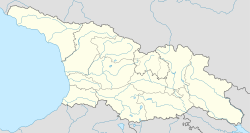Tsarche
This article relies largely or entirely on a single source. (September 2015) |
Tsarche
| |
|---|---|
village | |
| Coordinates: 42°41′50″N 41°40′14″E / 42.69722°N 41.67056°E | |
| Country | |
| Partially recognized independent country | |
| District | Gali |
| Time zone | UTC+3 (MSK) |
| • Summer (DST) | UTC+4 |
Tsarche (Abkhaz: Ҵарча, Georgian: წარჩე) is a village in Gali, Abkhazia, Georgia. It is located 17 km from Gali on the Samurzakano plain between rivers Okumi and Tsarche.[2]
History
[edit]Tsarche's name probably comes from two Megrelian words “tsar" meaning "water", and “che”, meaning "white", hence "White Water".
References to the village can be found in antiquity. Arrian (Arrian of Nicomedia) mentioned the river “Tarsura” and the town “Tarshen” on its side. Arkanjelo Lamberti wrote in the 17th century of Heta and after it Okumi which passes along Tarshen, where “Tarshen” is the same as “Tsarche”, but foreigners pronounced it differently. In 1654, The name "Tsarche" also appears on the map of Colchi (Samegrelo).[3]
The architectural monuments in the village confirm Tsarche's political and cultural importance in the North West of Georgia. According to Nodar Shonia, there are 23 historical monuments in Tsarche, including the Church of Epiphany, Tsarche's church of “Picheriste”, and two churches of so-called “Mapash Okhuame” (this means the tomb of the king in Megrelian). There were four ancient libraries too, but none exist now.[3]
“Mapash Okhuame” was built in the 13th-14th centuries is the architectural complex. The complex includes two churches, a fence, and a piece of gate. During the archaeological works in one of the churches there were found frescos of local nobles. I. Shervashidze thinks that these churches were built in the 15th century. Churches in Tsarche were renewed by Samegrelo's ruler Levan II Dadiani in the 17th century (1611–1657).[3]
During the archaeological works in one of the churches there was found writing in ancient Georgian Nuskhuri and there was name of someone Pashadze. Locals call "Pashadze’s Mountain" one of the mountains close to Tsarche village.[3]
See also
[edit]References
[edit]- ^ The political status of Abkhazia is disputed. Having unilaterally declared independence from Georgia in 1992, Abkhazia is formally recognised as an independent state by 5 UN member states (two other states previously recognised it but then withdrew their recognition), while the remainder of the international community recognizes it as de jure Georgian territory. Georgia continues to claim the area as its own territory, designating it as Russian-occupied territory.
- ^ Phicheriste church in Tsarche village Map of Architectural and Historical Buildings of Abkhazia
- ^ a b c d "თანამედროვე აფხაზეთის მატერიალური კულტურის ძეგლები (ნაწ.XIII)". expertclub.ge. Retrieved 2015-09-27.


